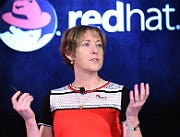Red Hat's Margaret Dawson: 'We're Really Not' Seeing Equality, Diversity in TechRed Hat's Margaret Dawson: 'We're Really Not' Seeing Equality, Diversity in Tech
She says society is subconsciously discouraging women and girls from pursuing careers in tech.


Edward Gately
Red Hat’s Margaret Dawson has been an executive in the channel for many years, with previous roles at Hewlett Packard, Symform, Hubspan and Napera Networks.
The senior director of global product marketing is well aware of the challenges women face in male-dominated tech. She has made it her mission to increase equality and diversity in this industry.

Red Hat’s Margaret Dawson
Dawson currently is traveling the country giving a speech called “Snort Out Loud.” It illustrates her belief that a perceived need to hold back and be something they are not is discouraging women and girls from pursuing a careers in tech.
She has developed five calls to action: women affirming women; less tears and more “kicks in the butt”; more intentional hiring of women; more women only tech conferences; and re-embracing feminism and its original intent.
In a Q&A with Channel Partners, Dawson talks about her experience in tech and what she hopes to accomplish by speaking out. She joined Red Hat, a provider of open hybrid cloud technologies, in 2015.
Channel Partners: You’ve been a successful executive in tech for many years. What’s been your key to thriving and succeeding in this male-dominated industry?
Margaret Dawson: I think there are a few things. One of the things I somewhat joke about, but it’s true, is that I grew up in the automotive industry, so when I got out of college I went and worked in Detroit just because I knew that environment and that market, and it is a very, very similar industry in that it is also male-dominated. In some ways, being in an industry where women are the minority and also loving the technology – like I still love muscle cars and lifting up the hood, and seeing how things work – served me very well when I ended up transitioning to tech a few years later. I found I really loved the technology and was very passionate about that, and asked a lot of questions. So that constant curiosity and passion about technology itself, and not finding it strange that I was in a situation where it was a majority of men has served me very well.
And then I think there [are] some other things as well in terms of being willing to take risks and kind of have an opinion for things, and sometimes jumping off the ladder so to speak, and going to a startup that was doing something new and different, and being willing to take that kind of risk. In a lot of my mentoring and coaching, I find that a lot of women will sometimes be very risk-averse. It ends up helping you because you not only learn new things, but you end up being involved in initiatives or activities that maybe put you in front of new people and new places, and kind of puts you in those leadership positions that you might not normally have.
And the other thing I would say is I’ve had a lot of focus on helping others be successful, whether those be executives that I have supported in the past, or people that have reported to me. And I think that karma does come back around.
CP: Are we seeing progress in terms of increased equality and diversity in tech?
MD: We’re really not. I think my passion for this story and why you’re seeing so much energy around wanting to see changes is (because) we’re not seeing the progress. In fact, in some ways, some numbers have even gotten lower in terms of …
…women staying in tech or leaders in tech, and even numbers of younger women getting into computer science. So while you’ll see little spikes once in awhile, the situation isn’t actually changing. And so I think that is the real concern. Why are we not seeing that improvement even though we know there’s more conversation about it than ever before, more awareness about it than ever before, more programs and initiatives about it than ever before?
CP: What prompted your decision to create and give your “Snort Out Loud” talk, and what’s the response been like?
MD: There are some things that haven’t changed, and some of it is the culture in tech and do women feel like they are comfortable in that culture or welcome in that culture. Is it still kind of that alpha-male situation and so you’re just not getting people who feel like that’s something that they want to be around.
But I think there are some fundamental things that are happening back in literally middle school and how we are continuing as a culture, and I say that quite holistically, to still not push girls to think that they can excel in math or excel in science, or take that risk. We tend to put this protection bubble around them socially and academically, and you see them break out sometime later and that bubble catches up with them and they’re like, “Oh, I’ll just go take this job that’s not going to be as difficult or challenging, or disruptive.”
So I think that we still have a lot of work to do. We have to be much more intentional, and that makes people uncomfortable, where you start talking about we need to intentionally encourage girls who show a propensity for math or science, or we need to intentionally promote women who show a propensity to succeed, and maybe even push them. I can tell you that personally there’s lots of women who have worked with me or around me where I’ve said hey, why don’t you do that presentation on the Internet of Things (IoT) instead of creating that presentation for your male colleague. There [are] some little things that we need to do, but really that word intention I’m using intentionally because we’re hoping it happens accidentally.
CP: If there is going to be real improvement in terms of women in tech, who needs to be a part of it?
MD: It’s the entire supply chain. It’s everything from companies needing to make very intentional cultural changes and hiring decisions, to individual managers needing to seek it out. I will tell you on my team, we talk specifically about are we getting diverse candidates, and I mean diversity beyond even just women. Are we seeking them out, and if we’re not getting them, what do we need to do. So if HR is not bringing them to us, we need to be proactive. So everyone on my team knows that we need to have a much more intentional, proactive approach. And that’s hard work. It’s much easier to say, “I got two resumes; they’re both white men. OK, that’s who sent me those resumes.”
Parenting has a huge impact. I can tell you when I do a lot of my speaking, the people that really are a community that can drive change are fathers in tech … because they want their daughters to be astronauts, and so they’re starting to see that and the change that they can drive can be huge, as well as mothers, teachers and administrators. If I think about where those bottlenecks happen, it’s something as simple as a middle-school teacher saying, “Oh, you don’t need to go into that math 3 class, why don’t we keep you in math 2. An innocent-sounding decision can tell a young girl, “OK, I can’t do that.” The subtleties are …
… so ingrained that it’s literally every person who needs to change it.
CP: What sort of feedback have you received regarding your five calls to action, and your talk in general?
MD: The feedback has been overwhelmingly positive, and there’s never been a single person who I’ve spoken to that that doesn’t resonate with. And I think the question is, whether it’s the five calls to action or whatever are the key things that we think need to happen, everyone nods their heads and says, “Oh, that’s so true. “But putting that into action is very hard. For example, take intentionally promoting and hire women. Everyone nods their head, “Oh yeah, we need to intentionally hire and promote women” … but to do that is hard work. Or if you say, “We’re going to intentionally hire a more diverse workforce … ” OK, so does that mean we’re going to go to different colleges and we’re going to do different things?
The more I can tell the story, the more I can be intentional in what I doing and that can have ripple effects. If everyone just finds their one thing … every little thing makes a difference. It’s going to ripple effect, but every person has to be intentional.
CP: Sounds like you remain optimistic that one day the tech industry will be much more diverse.
MD: I think so. I would love to say absolutely yes, but I will say I’m cautiously optimistic because I see the desire, I see changes in pockets. But if you walk into most startups in Silicon Valley, you’re still not going to see change.
I think there are enough people now that are really trying and we are seeing some positive motions forward, but in five years will we look drastically different than we do today, I don’t think so. I think it’s going to be a longer road than that. I would love to say yes, in five years it’s going to be 50 percent women, but I think it’s just going to take a lot more work than that. If we get more and more people thinking like that it will change.
Read more about:
AgentsAbout the Author
You May Also Like


